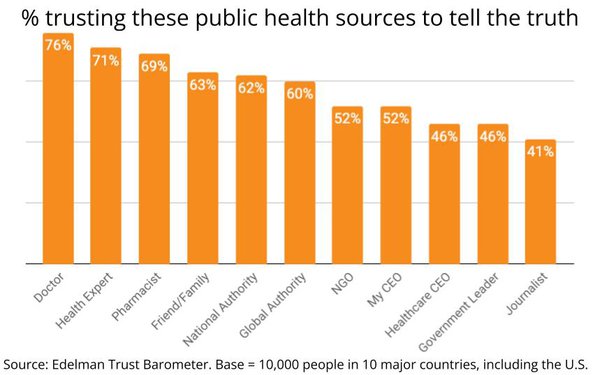
In a finding that raises big implications for health marketing
brands, as well as public health officials, a special edition of the Edelman Trust Barometer finds declining levels of trust for many sources of health information, as well as a marked divided among
the source relied on by people who have become fully vaccinated and those who have chosen not to be vaccinated against COVID-19.
Most worrisome of all, is the trusted information divide among
the two groups.
While doctors and national health experts ranked No. 1 and No. 2, respectively, among the fully vaccinated, those who have chosen not to get vaccinated have relied most on the
internet, friends & family, or no information at all.
And while the internet was among the least trusted source among the fully vaccinated, national health experts were the least trusted
source among those who have not chosen to be vaccinated.
The study, which surveyed 10,000 people in 10 major countries (the U.S., U.K. Canada, China, France, Germany, Japan, Mexico, Nigeria
and South Korea), was fielded Feb. 10-18 as part of a special report.
"Break through the information barrier," Edelman's research team advises as one of the conclusions of the report,
suggesting public and private health sectors "Elevate and amplify the voices they hear. Where there is less trust, go direct and go local; use expert voices for those with higher trust."
And
when trust in government lags, Edelman advises other institutions, including employers, "must play a larger role to build confidence in evolving public health measures and expert
recommendations."
The report concludes by noting that societies worldwide must prepare for the next public health crisis by building "resilience" and that "health organizations must take
action to address disparities in health outcomes. Engage on issues such as climate, poverty and racial justice."
